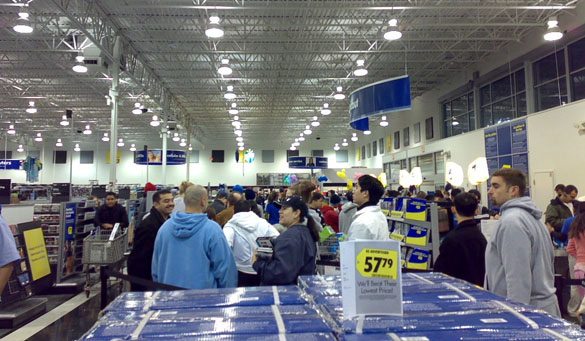Holiday Shoppers Should Assume Buying Habits Are Being Tracked
At the end of any given year, it's usually pretty easy to draw up a list of things that the past 12 months will go down in history for. While there are a number of things that could make 2013's list, on the technology side of things, privacy and security will undoubtedly be at the forefront of many people's minds. While those things have always been an issue, the unraveling of the NSA's spying efforts have forced many of us to begin genuinely caring about our rights.
As we're in the midst of the biggest shopping season of the year, there's no better time to highlight the fact that as you hand that plastic card over to a cashier or tap that "Checkout" button, you're being tracked. Disable cookies? That might not be enough. Pay with cash at the register? Ditto.
If convincing store cards or mobile shopping apps were non-existent, it'd be much more difficult for stores and agencies to track our behavior - if you use either of these things, you'd have to pretty much assume that every bit of data going through is being tracked, compiled, and potentially sold to third-parties.
 Credit: tshein (Flickr) |
Take one app, Snapette, for example, which tracks woman's fashion, and can help local stores send coupons via mobile to entice potential buyers. Some stores, like Macy's and JCPenny, have their own apps that allow consumers to get on-the-fly discounts as they walk through the store. Some even go as far as to reward customers for simply doing everyday shopping things, like trying on a new shirt or scanning a barcode for price-matching purposes.
Then there's Drawbridge, a company that takes things to the next level online. Recognizing the fact that cookies are being targeted as the biggest culprit in data-mining, Drawbridge has seemingly developed a technology that can single a person out simply by monitoring their movements online. The benefit for advertisers here is that you could be singled-out even if you use multiple computers - and again, we're talking about having cookies disabled.
So where does this data all go? Agencies, which then will sell it to those interested, namely stores and ad firms. Jeff Chester, the executive director at the Center for Digital Democracy, brilliantly states, "You know that song where Santa knows when you've been sleeping? He knows when you’re awake? Believe me, that’s where he’s getting his information from."
Some stores, though, might not even need to procure such information. A new product called Shopperception makes use of similar technology found in the Xbox Kinect's camera, and it's designed to track people in a store along with their behavior. Pick a product up off the shelf and then put it back? That could theoretically cue a nearby digital sign which can offer digital coupons or recommend an alternative product.
How scary is that? With that kind of technology, you could disable cookies, wrap your smartphone in aluminium foil before walking into a store, and still have your behavior monitored.
It goes without saying, we've reached a point where even if you don't want to be tracked, it seems very likely that you will be, and without your consent. That's not very comforting, is it?

